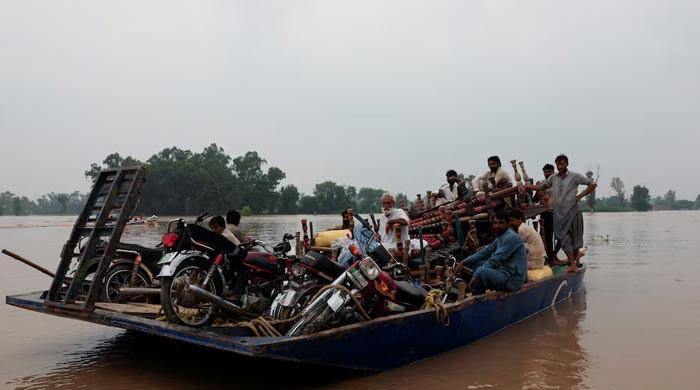Families Displaced by Floods in Kasur Following Cross-Border Tensions
When floodwaters originating from across the border in India inundated her village in Punjab earlier this month, Shama was prepared. She gathered her four children, knowing they had to evacuate. This marks the second instance this year where she’s had to abandon her residence, the first being during the skirmishes between Pakistan and India in May.
“How many more times will we be forced to leave?” questioned the 30-year-old mother, whose husband was assisting in moving their ten cows to safer ground via boat. “We suffered significantly during the conflict, with the children missing school. Now, the rising waters are displacing us again. It’s one hardship after another.”
Shama’s plight is shared across flood-stricken Kasur, where families express weariness from recurrent displacements within a few months, initially due to conflict and subsequently due to the natural disaster.
“The floods began earlier in the month and have only worsened,” stated Bibi Zubaida, a 27-year-old mother residing with seven family members in a three-bedroom house near a mosque, which is now used to broadcast evacuation warnings.
The mosque’s loudspeakers, usually used for prayer announcements, now broadcast a different message: boats are available for those wishing to evacuate.
“Living here means accepting the potential for both war and floods. Where else can we go?” Zubaida lamented.
Kasur is situated only a few kilometers from the Indian border. Residents report seeing Indian checkpoints from their rooftops and rescue boats, highlighting the interconnectedness of their fate with decisions made across the border.
The two nations share rivers managed under the Indus Waters Treaty for over six decades. However, India reportedly suspended the agreement earlier this year, after 26 fatalities that New Delhi attributed to actions supported by Islamabad, which Pakistan denies.
This event led to brief but intense cross-border clashes between the two countries, both nuclear powers, compelling villagers like Shama to flee.
Then the monsoon season arrived, transforming the rivers into raging floods.
On small wooden boats, families transported their motorcycles, possessions, and livestock along with their children, as rescue teams guided them through flooded fields.
Rescue worker Muhammad Arsalan noted the reluctance of many villagers to evacuate.
“People are often hesitant to leave due to fears of theft. They are unwilling because they have already experienced this multiple times,” Arsalan explained, adding that he has transported over 1,500 individuals to safety in recent days.
“They are deeply attached to their animals and sometimes refuse to leave without them,” he added, pausing to clear debris from the boat’s motor.
Reports indicate at least 30 deaths thus far, with the floodwaters progressing southward through Punjab, endangering new areas.
In India, cloudbursts in the Ramban and Mahore regions of Indian Illegally Occupied Jammu and Kashmir (IIOJK) resulted in 10 fatalities.
Pakistani officials contend that India’s decision to suspend the Indus Waters Treaty, thereby halting the exchange of river data, exacerbated the crisis. Islamabad also accused India of releasing significant amounts of water without proper notification.
“If the treaty were in effect, we could have managed the situation more effectively,” stated Planning Minister Ahsan Iqbal.
Farmers report severe damage to their livelihoods. “Thirteen of my fifteen acres are ruined,” said Muhammad Amjad, a rice and vegetable farmer. “Women and children are mostly evacuated. Men stay to protect what remains.”
Successive displacements underscore the fragility of communities located along the country’s eastern border.
Authorities caution that the situation could worsen due to climate change amplifying monsoon seasons and cross-border water disputes impeding disaster preparedness.
“I’ve witnessed numerous floods, but they are occurring more frequently now,” said Nawabuddin, a 74-year-old landowner, recalling significant floods in 1988, 2023, and the current one.
“We desire neither war nor excess water. We simply wish to live,” said Zubaida, whose recently renovated home and farmland are now submerged.



Comments (0)
No comments yet. Be the first to comment!
Leave a Comment